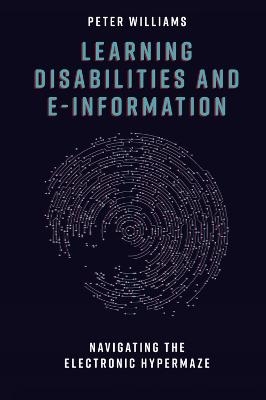
Learning Disabilities and e-Information
Emerald Publishing Limited (Verlag)
978-1-78973-152-1 (ISBN)
Digital Technology is becoming ever more used by people with learning disabilities for information, entertainment and to enjoy self-expression. Despite this, there is a paucity of research into how this cohort negotiate electronic interfaces, interpret images, navigate pages and read online; what barriers there might be, and how these could be obviated. This book explores these issues, establishing how these and other factors facilitate or inhibit information access and behaviour more generally. There are plenty of guidelines and accessibility standards regarding electronic information presentation, but most are outdated or have been formulated without empirical evidence. Unlike prior literature this book is the result of many years's research in the field, considers specific information contexts, and develops new concepts in information behaviour. It is written in non-technical, jargon-free language, relevant for academics, students and professionals; from human-computer interaction researchers, learning disability specialists and information scientists to formal and informal carers and supporters, college tutors, family members and others.
Peter Williams is an Honorary Senior Research Fellow in the Department of Information Studies, University College London, UK. He has spent the last 25 years investigating the role and impact of digital technology – in particular the Internet - in the health service, media and education. He recently completed a British Academy Fellowship on 'The Digital Lives of People with Learning Disabilities', extending and complementing his PhD thesis which examined web site design for the same cohort. Peter is the author/co-author of three books and over 130 journal articles and book chapters.
Chapter 1. Definitions, models, needs
Chapter 2. Issues inherent in researching learning disabilities
Chapter 3. The web and people with learning disabilities
Chapter 4. Methods to test Website usability
Chapter 5. Website usability - eliciting the issues
Chapter 6. The use of images
Chapter 7. Investigating the attributes elicited in consort
Chapter 8. 'Serial access' to information
Chapter 9. 'Random','direct' and 'iterative' access
Chapter 10. Examining website preferences
Chapter 11. A shrinking world: mobile devices and usability
Chapter 12. Testing the usability of a mobile app
Chapter 13. Facilitating information access
Chapter 14. Conclusion
| Erscheinungsdatum | 15.06.2020 |
|---|---|
| Verlagsort | Bingley |
| Sprache | englisch |
| Maße | 152 x 229 mm |
| Gewicht | 411 g |
| Themenwelt | Schulbuch / Wörterbuch ► Unterrichtsvorbereitung ► Unterrichts-Handreichungen |
| Sozialwissenschaften ► Pädagogik ► Sonder-, Heil- und Förderpädagogik | |
| ISBN-10 | 1-78973-152-6 / 1789731526 |
| ISBN-13 | 978-1-78973-152-1 / 9781789731521 |
| Zustand | Neuware |
| Haben Sie eine Frage zum Produkt? |
aus dem Bereich


